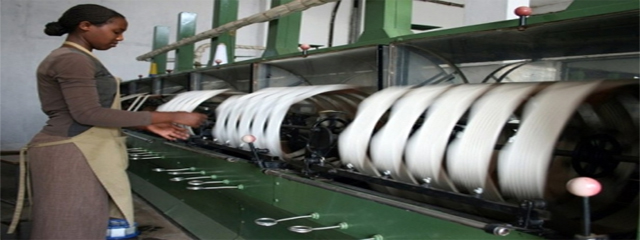In 2013, a major policy discourse within and between the supranational bodies that influence policymakers in sub-Saharan Africa was the industrialization of the continent. These bodies include, but are not limited to, the African Union (AU), the United Nations Economic Commission for Africa (UNECA), and the United Nations Industrial Development Organization (UNIDO).
Industrialization is defined as: “The process in which a nation or continent transforms itself from a primarily agricultural society into one based on the manufacturing of goods and services.” During the trans-Atlantic slave trade and later the colonial era, Africa supplied raw materials and labor for the industrial development of Europe and North America. This practice continues until today. Much of sub-Saharan Africa still has a high dependence on primary products, exporting much of its raw materials without adding value to them while importing manufactured goods.
The crux of the continent’s development narrative is how to leverage the current economic growth in the region, in addition to other favorable conditions, as a bridge to help facilitate industrial development.
Economic Growth and Value Addition
Gross Domestic Product (GDP), the economic indicator, is defined by the World Bank as: “[The] sum of gross value added by all resident producers in the economy plus any product taxes and minus any subsidies not included in the value of the products.” Economic growth is linked to creating value by adding value to a nation’s raw or intermediate materials.
Unfortunately, however, adding value to sub-Saharan Africa’s own natural resources has not been a strength of the continent. In spite of this, the World Bank Africa’s Pulse and the IMF World Economic Outlook (WEO) state that the economies of sub-Saharan Africa have, since the late 1990s to 2013, been experiencing consistent economic expansion. Six of the world’s fastest growing economies are currently within this region. Whereas economic growth slumped for most of the world in recent years, sub-Saharan Africa’s growth has stayed resilient right through the global recession.
The IMF’s World Economic Outlook for October 2013 estimates that 16 countries in sub-Saharan Africa will experience GDP growth greater than or equal to 6%. It forecasts 15 more countries to experience economic growth of 4-6% — meaning 31 out of the total 45 countries analyzed in sub-Saharan Africa are expected to experience economic growth greater than or equal to 4%. This is significant when one considers that the growth of advanced economies in the same period is forecasted to be 1.2%.
The reasons suggested for the economic growth are many. According to Bretton Woods Institutions, much of the growth is a result of increased world commodity prices. The 2013 Africa progress report concurs and enumerates other reasons for the growth such as improved macroeconomic policies, increased investment in infrastructure, institutional development, the deepening of financial systems, and rising productivity.
Read the whole article here






Be the first to comment on "Africa Must Industrialize Now"